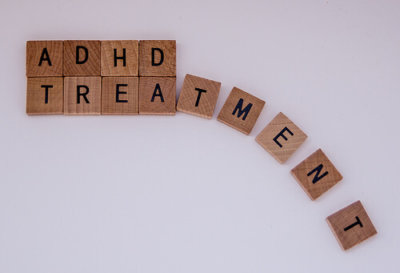Adult ADHD Treatment – What are the Drug-Free options?
by Andrea M. Darcy

photo by Darya Sannikova for Pexels
Concerned you might have adult attention deficit disorder? But you have avoided support or a diagnosis, because you are afraid you’ll just be offered medication?
Medication is indeed the first line of treatment recommended in the UK for adult ADHD. A good psychiatrist will monitor your progress carefully, to find the right medication and dose for your needs.
But taking medication for adult ADHD is your choice. If you prefer, you can choose to try other routes.
(Need more info about attention deficit hyperactivity disorder? Read our comprehensive guide to adult ADHD).
Alternate Treatment Approaches For Adult ADHD
And it’s recommended you try other ADHD treatment approaches whether or not you take medication. After all, medication might give you new focus, but it can’t change entrenched habits from a lifetime of living with the disorder. So what might, then?
CBT Therapy
is the recommended psychological treatment for adult ADHD in the UK and is evidence-based to work. An overview of all research around ADHD and CBT concluded positively that CBT is “promising in producing significant symptom reduction”.
It is suggested you take a course of CBT therapy even if you do choose medication.
In cases of mild adult ADHD, CBT Therapy alone can sometimes be enough to help clients feel in control of life again.
How does CBT help you with your adult ADHD? CBT trains you to spot and control the cycle between your thoughts, feelings, and actions.
This leads to recognising thoughts as thoughts, instead of just reacting to them. With impulsivity being a major problem for adult ADHD sufferers, this translates to less regret for doing things without thinking.
 It’s also helpful therapy for managing the frustration and low self-esteem that ADHD causes. CBT helps you see how your emotions are triggered by thoughts, and that you can question the validity of these thoughts and stop the downward mood spiral.
It’s also helpful therapy for managing the frustration and low self-esteem that ADHD causes. CBT helps you see how your emotions are triggered by thoughts, and that you can question the validity of these thoughts and stop the downward mood spiral.
If you do decide to try CBT Psychotherapy, make sure the therapist specialises or has experience in working with clients with adult ADHD, so they can angle the therapy to suit.
Mindfulness
There is good reason mindfulness is popular – and that is because it works.
Mindfulness improves focus, the holy grail for those with adult ADHD. A 2011 study on mindfulness and the brain even showed how it helps deactivate the network in the brain responsible for ‘wandering mind’.
By helping you pay attention to what you are really thinking, feeling, and experiencing right here and now, it’s like mindfulness takes away the static so your focus can skyrocket.

By: Elizabeth M
Mindfulness also lowers impulsivity. The rocket fuel for impulsivity is comparisons from the past and worries about the future. “I failed to take this opportunity last time so I better just grab it”. “If I don’t book a ticket now and follow him to another country I’ll never see him again”.
Practicing mindfulness means you make decisions from what you are actually feeling and experiencing in the present moment, and slow yourself down enough you create a window to think things through.
You can realise you don’t actually want the job in media you missed last time as you like your job in finance now, so you don’t need to impulsively accept an interview. And that moving country makes you feel anxiety so probably isn’t the right choice after all.
ADHD Coaching
While CBT can help you be more in control of your impulses and moods, its focus is not on keeping you on track with your goals. And if one thing can lower your self-esteem it’s the constant failure to finish what you set out to do that ADHD can cause.
An ADHD coach works to help you move forward despite your distraction. And many of them have ADHD themselves, so they know what they are talking about and can spot your self-sabotage fast.
Self-Help for ADHD
Self treatment can mean many things, such as researching attention deficit hyperactivity disorder so you know what you are dealing with, or talking to others in support forums so that you feel less alone and your self-esteem issues over being ‘different’ can be bolstered.
Other self-help approaches can include lifestyle management techniques such as learning about time management or looking at ways to build more structure and support in your life. Perhaps you want to hire a personal assistant to keep you accountable, and look at ways to explain your ADHD to your family so they can be more encouraging.
One of the best self-help techniques for adult ADHD (and moods in general) can be physical exercise. The endorphins released can have a calming effect that gives a window of focus following your workout. It also helps with better sleep, which the busy mind ADHD brings can make difficult for some.
And diet is another self-help route. Well not evidence-based, it is thought that a healthy diet low on sugars and including supplements like fish oils can be useful.
But can these things really help as much as drugs?
It’s worth noting that all of the above tactics are about support and commitment. It could be said that the best thing you can do if you have adult ADHD is to make a commitment to yourself to get the support to manage better. And whether that looks like medicine or meditation and therapy, it’s the commitment and the courage to seek help that really does make a difference.
Harley Therapy offers CBT-based therapy for ADHD in London at three different locations. They also offer highly respected psychiatrists who specialise in the diagnosis of adult ADHD.
 Andrea M. Darcy is a health, lifestyle, and wellness writer, as well as a mentor. She has ADHD herself and has tried both medications and other forms of treatment. She found some of the treatments mentioned in this article more helpful than medications in her case. Find her @am_darcy
Andrea M. Darcy is a health, lifestyle, and wellness writer, as well as a mentor. She has ADHD herself and has tried both medications and other forms of treatment. She found some of the treatments mentioned in this article more helpful than medications in her case. Find her @am_darcy




